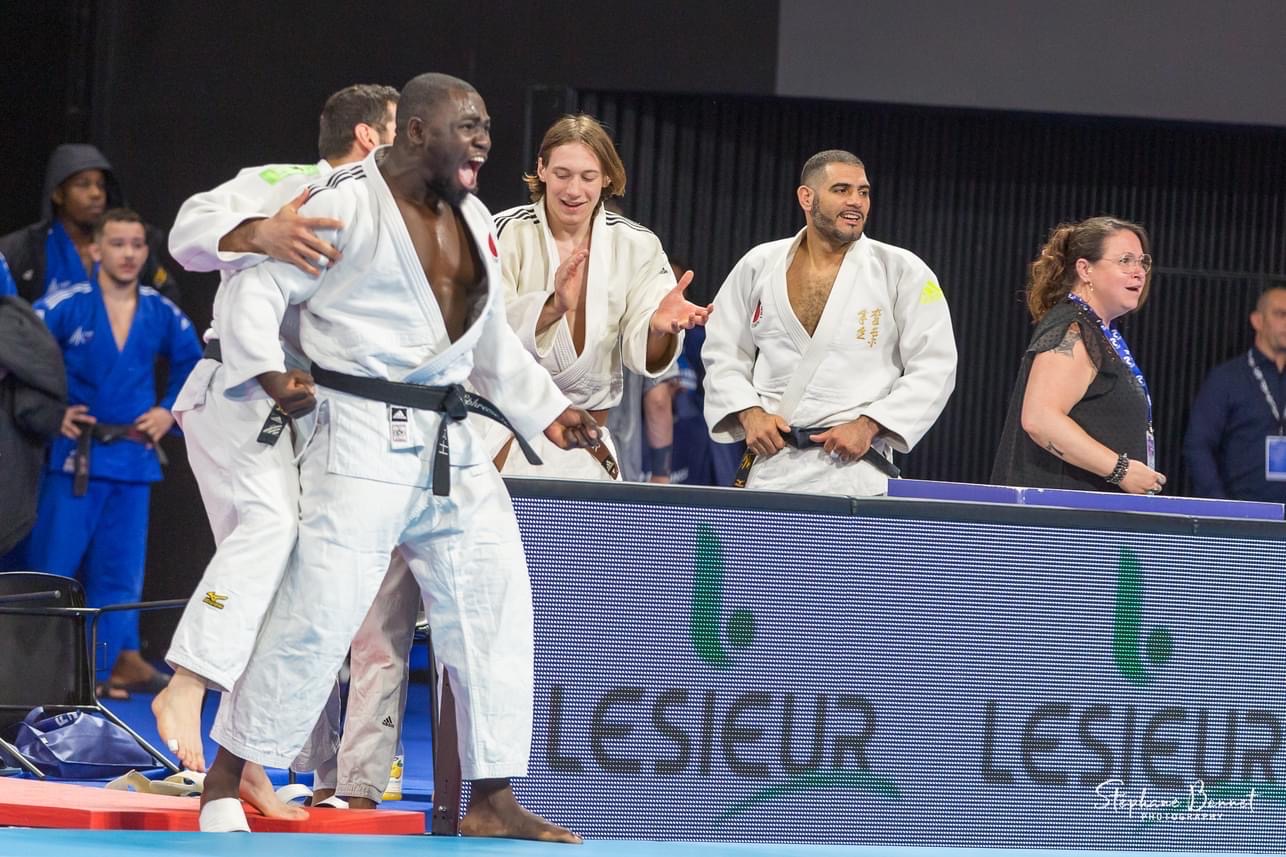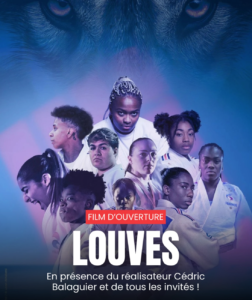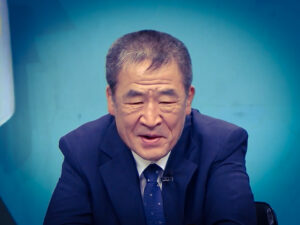Born on January 7 1978, in Lyon, “Lolo” has been a pillar of the Dojo Olympic for two decades, a club in the third district of the capital of the Roman Gaul which, in 2023, has reached its personal Graal: a seventh place in the French senior team championships. The culmination of a long journey as a daughter, as a mother and as a woman. – JudoAKD#003.
A French version of this interview is available here.
Your family name is steeped in Lyon judo history. How did judo come into your family and how did you get involved in?
Judo came into my family through my grandfather Vincent (1925-1996), a great sportsman who was one of the forerunners of Lyon judo. In 1949, he founded the Judo Club de Gerland, which is now run by his son Vincent Jean, my uncle. In 1975, my father Geff, the eldest in the family, founded the Dojo Olympic with France, my mother. It was on a tatami that I took my first steps. With my older sister Séverine, we spent much of our childhood between school and the dojos. Then, at the age of seven, I fell ill.
What happened to you?
It was a benign but little-known illness. I stayed in school but was often absent for hospital stays. My appearance began to change. At school, I became a special little girl. One of the only things that kept me going as a normal child was the mat, where I felt like everyone else. The doctors forbid me to take up sport, but my father reassures them and adapts his classes for me. At the age of 13, the signs of the disease became almost non-existent, enabling me to start competing and enter the departmental class under my father’s ever-watchful eye.
What did your doctor say?
In the end, he gave the go-ahead. I started training every day to make up for lost time. As I said earlier, I grew up around tatamis. What appealed to me most was the relationship that the sport creates between people. Through its values, judo brings a sense of security. It’s a microcosm where life is good. As an athlete, judo – which I consider to be a tough sport – pushes you to your limits and teaches you to go further, harder and smarter.

Who have been your role models?
Of course I admire my grandfather, but it was my dad who passed on my passion. He was an atypical character, an artist who was sometimes misunderstood. For me, he was ahead of his time in terms of his vision of judo, his mindset transmission and his relationship with his pupils, whether they were competitors or not. He was the indispensable person at my competitions… Others have also played an important role like my uncle Vincent, who taught me high-performance ne-waza. And then there were all those encounters: Patrick Nolin and Arnaud Perrier at the Pôle Espoir in Lyon, André Delvingt when I took my state certification in Orléans, Thierry Marchand again in Orléans. And then there’s René Nazaret, my judo granddad, an example of humility. All very different and charismatic teachers.
And what about champions?
In terms of champions, of course there were our first two Olympic champions in Barcelona, Cathy Fleury and Cécile Nowak. They helped launch women’s judo to the heights it has reached today.
What do you remember from your competition’s years?
I’m proud of my investment and commitment, because I did more than just do my best: I gave it my all. If I have any regrets, it’s about my weight management, which still handicaps me today, and the fact that, as a training machine, I forgot about rest phases. This had consequences during the major events of my seasons, because I’d arrive too tired, and so I’d miss out.
You’ve had your doubts, so…
Of course I have. As I tell my students, judo isn’t a linear thing. Sometimes you can do the best training in the world and the next day have no feeling at all. But I’ve always loved training, loved progressing, loved learning, because that’s what keeps the fire burning. And, above all, I’ve always loved judo.
What do you mean by that?
This first part of my career taught me several things. Firstly, when you’re strong in one category, you’re strong in the one above. Secondly, it’s important to listen to your body and your mind, and to respond to your needs. Likewise, you need to surround yourself with the right people, and learn how to rise above the system to find what’s right for you. Finally, while it’s sometimes necessary to be selfish in order to succeed, you mustn’t forget all those wonderful friendships and encounters that keep you going.
What motivated you to go into teaching?
My father didn’t want me to be a judo teacher. He wondered how I could have a family, with all the demands of the job. So I never thought about it, even though I loved teaching with him. The turning point came when I returned from Orleans. I’d just given up my dream of becoming a champion, and I was struggling to find my place at the club. I’ve gone from being a self-centered athlete to a teacher, even if it’s a gradual process.
Which steps?
I took up a part-time position as a judo instructor at the Fourvière Medical and Educational Institute. I was the judo teacher for Down’s syndrome and disabled youngsters aged between 12 and 20. I also looked after them during sports and informal times. I took part in meetings with the psychologists and work in tandem with the psychometrician.
How has this experience affected your approach to teaching?
It has forced me to rethink my activity, and sometimes even reinvent it. I’m changing my vision and posture. I’m gradually understanding the teacher I want to become. Individualize training, adapt it, make it even more lively. Pass on the pleasure of practicing. I’m not really concerned with making champions, but rather with ensuring that judo, a school of life through its values, serves as a guide for those who practice it.
Coming from a dynasty of judokas, I guess that has its good and bad sides. At what point did you feel you’d made a name for yourself?
When talking about my family, it’s important to find the right words. I’m proud to be part of this dynasty, but I quickly realized that I would have to make a name for myself, indeed. In this dynasty, there are men with very strong characters, and women, less exposed at first glance but just as important. In every town in France, people talk to me about my family. I love that, just as I love reminiscing with my friends about all the memories we share. I love the affection that my dad’s friends like Jean Pourchet and Angelo Parisi have, and the way they pass it on to me.

Is it more difficult to be born a Valente or to become one?
It was difficult to take over a place that was already occupied and well occupied, to live up to the expectations raised by my name while at the same time having my own personality. There were arguments and confrontations because, as they say, dogs don’t make cats and I’ve got a bit of a temper myself. I have my own way of seeing things, even if it’s inspired both by my family and by lots of other encounters. For example, I have a very personal vision of what I want for my club.
Is your family background a hindrance or an asset?
When I was a competitor, it was sometimes a handicap. What’s expected of a teacher’s child is filled with too many demands, too many expectations. Other teachers maintain a certain distance because the parent-child, coach-trainer relationship, is far too strong. But I have no regrets.
We’ve known each other for a long time, and it’s true that you’ve never given off the image of the withdrawn girl…
When I was young, I already enjoyed sharing moments with girls from all the other clubs of the area. After that, I kind of forced things. Little by little, I carved out my own place, supervising the department’s training courses and showing who I am with sincerity and authenticity. In the end, I think judokas have always known me as Lolo. Geff’s daughter, of course, but above all Lolo. Sometimes today, my name is recognized only because it’s mine. And that’s something to be proud of.
You have the distinction of being a teacher and a mother. How do you reconcile the two, especially in the evenings and at weekends? Do you reproduce what you knew as a child, or do you operate differently?
Being a teacher and a mom is quite a challenge, I admit. What’s more, for the past eleven years I’ve been a single mom to Zoé, 17, and Lily, 11. At home, my mom looked after us when dad was at work, and we had maternal grandparents who were very present, even though we were often at judo.
How did you juggle with your daughters, especially when they were little?
I had a lot of help from my sister, my brother-in-law and my parents, especially when Lily was little. She was also very often in my arms during judo lessons, and on the tatami mats at weekends. Zoé too, since their dad was a judoka. And then there are our friends, of course.
What bonds have you forged with your daughters, in spite of or thanks to this organization?
My daughters and I are very close, very fused. They know that they are my priority, but they also know that I love my job, that my club is my second family. And that what makes me a strong mother is judo.
How did you achieve this balance?
I compensate as I can when I’m not around a lot, and above all we talk a lot. When they’re missing something, they don’t hesitate to talk to me about it. I also owe it to them to be so fulfilled in my job. They have gone through and continue to go through life’s lessons with me, and give me that extra strength without which many things would not have been possible.

One of your great professional achievements was the fact that on May 27, 2023, the Dojo Olympic ranked in the France first division senior team competition for the first time in its history. What does this result mean to you?
What can I say about this incredible 7th place for the senior team in 2023? How do I find the words? How can I put into words the emotions we all felt and shared together? This team, this ranking, it’s not just a team. It’s not just one day. It’s not just a moment. It’s the investment of an entire club, a part of each person who has been part of this team, who has helped it grow and evolve. It’s also the work of the volunteers, of my mom France, the president, who lets me make all the sporting choices. It’s the work shared with the other teachers, in particular with my partner Jeremy Cure. But above all, it’s the heart. The guys fought with passion and love. They supported each other, like a family. We were all one single heart.
How did you feel about that day, having been on the chair for so many years?
At the time, I didn’t really realize what was going on. Everything just flowed. I think they had as much confidence in themselves as I did. I got in the car and said to myself: “We’ve done the job”. Then came the phone call on the way to Steph Auduc. I went home and my big sister said to me: “Mum, you’re the coach of one of the eight best senior teams in France”. The next day, we were competing and all our colleagues and friends congratulated us. I think that’s the moment when I realized what a great result it was. The big clubs and coaches now recognize us! Before all that, I was already very proud of my club. I was aware of everyone’s abilities. Thanks to this result, the youngsters in turn have gained in self-confidence, and the club continues to evolve…
This might be a good time to talk about the loyalty and longevity of your competitors. To what do you attribute this?
Frankly, there are so many parameters that I don’t really know where to start. First of all, there are the solid foundations already laid. My father and mother often had judokas over to the house. They’ve always been part of my family, whether for birthdays or Christmas. I’ve always seen them get involved, not just in judo but in everyone’s life.
You mentioned Stéphane Auduc’s phone call on the way home from that national team competition…
Steph, I grew up with him. Even though his duties and skills have called him to Paris for a long time now, he resumed his license at the club two years ago. He’s part of the Dojo Olympic family. We often call each other to talk about the club. He advises me, he listens to me, he’s like a big brother to me, in fact. He’s just one of many examples of people who drop in just to say hello. They remind us how important judo in general, and the club in particular, has been in their lives. As I’ve already told you, I enjoyed growing up in this world. So, when I took over the club, I felt it was essential to keep this family spirit. And then there was luck.
What luck?
The chance to meet all those incredible people who, one day, pushed open the club’s door. Today, they are our leaders, the ones who come to judo to show the way, who show that at over 40, you can still surpass yourself. It’s an ongoing exchange. Jérôme Muller, who looks after the departmental class and was part of the team adventure when he arrived from Dijon. Mohamed Guerbaa, with whom I had the joy of sharing the position of seventh to the teams, who passes on his wisdom and values. Sylvain Barzic, one of my first first division athlete, always there to give me a hand in developing the youngsters, but unfortunately injured for the teams. Philippe, Papy, Christophe… We’re always there for each other, through moves, births, hard times… The most important thing is to maintain the link. That’s my role, as head of the family.
How do you go about it?
When judokas arrive from other clubs, I make sure they feel at home. I try to pay attention to everyone. They all have different needs, and it’s up to us to try and meet them. Like our young people arriving from the French overseas departments and territories, with whom I have very strong ties since they are far from home. I can’t talk about management without mentioning Ephreme Kopa, the youngest, who is now in charge of training, and who is, as I like to say, my spiritual son. It’s a daily job to maintain this link.

It’s often a matter of people…
In a big club, it’s not always easy to look after everyone. So I ask them to communicate a lot, and I often question myself. Then there’s France, my mom, who’s still club president and the goodwill keeper. She also accompanies our young people on internships at the club and, thanks to her, some of them have found jobs, while others have been helped to obtain their papers. I share my views with the club’s managers and other teachers, so as to get an objective opinion that differs from my own. The club’s team of teachers is solid. There are lines to be respected, and each person’s personality expresses itself. And then there are all the moments and emotions shared during competitions and trips. Sometimes I see them more than my own children. I often tell them that it’s sometimes difficult to leave for a tournament, but that once you’re in the car with them, everything makes sense. The Dojo Olympic is my family, and I think it’s also many of our judokas one. As in all families, there are moments of sharing, arguments, fine-tuning and a lot of love.
A few years ago, you took a training course in Clermont-Ferrand, which you told me helped you develop a lot. Can you tell us more about it?
In 2018 I did indeed take a degree in mental preparation and performance support. Almost twenty years of teaching, and this feeling of stagnation in my way of seeing things. I needed new tools. I’ve always been very interested in mental preparation and the personalized coaching of competitors. I then went on to train as a sophrologist.
What certainties did this new knowledge shake up?
I’ve been able to rethink the way I coach, and remember just how important words are. I now take into account each personality, each individual with his or her resources and strengths. Mental preparation also enabled me to look at myself. I’ve started to work on myself, which has enabled me to question myself and see things in a new light. Every judoka is a different person, and we have to take into account the whole thing. That’s the only way we can help them develop their full potential. From a very early age, we teach our judokas abdominal breathing and, as time goes by, we integrate new tools so that they make them their own. I then work with the older children in workshops, and sometimes with individual coaching. The aim of the team of teachers, physical and mental trainers is to turn our judokas into independent, enlightened athletes. And, for the club as a whole, to prioritize the pleasure of learning and practicing.
If today’s Lolo could give advice to the Laure-Cathy who donned her first white belt four decades ago, what would it be, given all that lies ahead?
I’d tell this little girl putting on her judogi for the first time that she’s in for a great adventure. That this cape of invincibility will enable her to face up to life’s lessons, and above all that she’ll remain herself, authentic and sincere. That her hypersensitivity, so difficult to manage, will ultimately be one of her greatest strengths. I’d advise her to go to the people who know, to step back from the system and always do what’s right for her, to pay attention to her body and her mind. Finally, I’d tell her to trust herself, because she’s the only one who really knows who she is. – Interview by Anthony Diao, spring 2024.
A French version of this interview is available here.
More articles in English:
- JudoAKD#001 – Loïc Pietri – Pardon His French
- JudoAKD#002 – Emmanuelle Payet – This Island Within Herself
- JudoAKD#004 – Back to Celje
- JudoAKD#005 – Kevin Cao – Where Silences Have the Floor
- JudoAKD#006 – Frédéric Lecanu – Voice on Way
- JudoAKD#008 – Annett Böhm – Life is Lives
- JudoAKD#009 – Abderahmane Diao – Infinity of Destinies
- JudoAKD#010 – Paco Lozano – Eye of the Fighters
- JudoAKD#011 – Hans Van Essen – Mister JudoInside
- JudoAKD#021 – Benjamin Axus – Still Standing
- JudoAKD#022 – Romain Valadier-Picard – The Fire Next Time
- JudoAKD#023 – Andreea Chitu – She Remembers
- JudoAKD#024 – Malin Wilson – Come. See. Conquer.
- JudoAKD#025 – Antoine Valois-Fortier – The Constant Gardener
- JudoAKD#026 – Amandine Buchard – Status and Liberty
- JudoAKD#027 – Norbert Littkopf (1944-2024), by Annett Boehm
- JudoAKD#028 – Raffaele Toniolo – Bardonecchia, with Family
- JudoAKD#029 – Riner, Krpalek, Tasoev – More than Three Men
- JudoAKD#030 – Christa Deguchi and Kyle Reyes – A Thin Red and White Line
- JudoAKD#031 – Jimmy Pedro – United State of Mind
- JudoAKD#032 – Christophe Massina – Twenty Years Later
- JudoAKD#033 – Teddy Riner/Valentin Houinato – Two Dojos, Two Moods
- JudoAKD#034 – Anne-Fatoumata M’Baïro – Of Time and a Lifetime
- JudoAKD#035 – Nigel Donohue – « Your Time is Your Greatest Asset »
- JudoAKD#036 – Ahcène Goudjil – In the Beginning was Teaching
- JudoAKD#037 – Toma Nikiforov – The Kalashnikiforov Years
- JudoAKD#038 – Catherine Beauchemin-Pinard – The Rank of Big Sister
- JudoAKD#039 – Vitalie Gligor – « The Road Takes the One Who Walks »
- JudoAKD#040 – Joan-Benjamin Gaba and Inal Tasoev – Mindset Matters
- JudoAKD#041 – Pierre Neyra – About a Corner of France and Judo as It is Taught There
- JudoAKD#042 – Theódoros Tselídis – Between Greater Caucasus and Aegean Sea
- JudoAKD#043 – Kim Polling – This Girl Was on Fire
- JudoAKD#044 – Kevin Cao (II) – In the Footsteps of Adrien Thevenet
- JudoAKD#045 – Nigel Donohue (II) – About the Hajime-Matte Model
- JudoAKD#046 – A History of Violence(s)
- JudoAKD#047 – Jigoro Kano Couldn’t Have Said It Better
- JudoAKD#048 – Lee Chang-soo/Chang Su Li (1967-2026), by Oon Yeoh
Also in English:
- JudoAKDReplay#001 – Pawel Nastula – The Leftover (2017)
- JudoAKDReplay#002 – Gévrise Emane – Turn Lead into Bronze (2020)
- JudoAKDReplay#003 – Lukas Krpalek – The Best Years of a Life (2019)
- JudoAKDReplay#004 – How Did Ezio Become Gamba? (2015)
- JudoAKDReplay#005 – What’s up… Dimitri Dragin? (2016)
- JudoAKDReplay#006 – Travis Stevens – « People forget about medals, only fighters remain » (2016)
- JudoAKDReplay#007 – Sit and Talk with Tina Trstenjak and Clarisse Agbégnénou (2017)
- JudoAKDReplay#008 – A Summer with Marti Malloy (2014)
- JudoAKDReplay#009 – Hasta Luego María Celia Laborde (2015)
- JudoAKDReplay#010 – What’s Up… Dex Elmont? (2017)
And also :
- JudoAKDRoadToLA2028#01 – Episode 1/13 – Summer 2025
- JudoAKDRoadToLA2028#02 – Episode 2/13 – Autumn 2025
JudoAKD – Instagram – X (Twitter).


